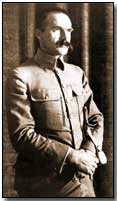Primary Documents - Announcement of Joseph Pilsudski's Immediate Plans, 14 November 1918
 With Germany defeated in
November 1918 the path was cleared for a newly constructed Polish republic
to be established with Allied backing; this was duly declared on 10 February
1919. This was however by no means the end of uncertainty for Poland,
with the ultimate makeup of Europe yet to be agreed at the Paris Peace
Conference, and with military disagreements with Russia, the Ukraine and
Czechoslovakia rumbling on.
With Germany defeated in
November 1918 the path was cleared for a newly constructed Polish republic
to be established with Allied backing; this was duly declared on 10 February
1919. This was however by no means the end of uncertainty for Poland,
with the ultimate makeup of Europe yet to be agreed at the Paris Peace
Conference, and with military disagreements with Russia, the Ukraine and
Czechoslovakia rumbling on.
Click here to read the statement issued by the Polish Regency Council - established by the country's wartime German occupiers - on 11 November 1918 (the date of the armistice) which announced that General Josef Pilsudski, newly freed from German incarceration, was to be appointed to military command of Poland's Army. Click here to read a subsequent decree, issued three days later, in which the Regency Council formally announced its own dissolution in favour of Pilsudski pending assembly elections. Click here to read a statement issued by Pilsudski on the same day in which he outlined his immediate plans.
Click here to read an interview conducted with Pilsudski by a French newspaper in February 1919. Click here to read the text of the U.S. government's formal recognition of the Polish government, by now politically led by Ignace Paderewski (with Pilsudski's blessing while the latter oversaw military matters). Click here to read an address issued by Paderewski in May 1919 in which he summarised events to date at the Paris Peace Conference. Click here to read a statement issued by Paderewski in September 1919 in which he expressed his support for Polish entry into the League of Nations.
Click here to read a statement issued by Herbert Hoover - head of the U.S. reconstruction organisation in Europe - dated August 1919 in which he documented his reservations with regard to the speed with which Poland's economic infrastructure could be rebuilt.
Statement by Josef Pilsudski on Accepting Military Command of Poland, 14 November 1918
Upon my return from German imprisonment I found the country in a most chaotic state in the face of exceedingly difficult tasks, for the performance of which the nation must reveal its best organizing abilities.
In my conversations with the representatives of almost all political parties in Poland, I found to my delight that the great majority share my opinion that the new Government should not only rest on democratic foundations, but be composed in a considerable proportion of representatives of the rural and urban masses.
The difficult life conditions of the people have not allowed very many among them to attain professional expertness, which is in such great demand throughout the country. Realizing this, I have requested that in the interest of the highest efficiency the President of the Government appoint to the Cabinet recognized experts without any reference to their political affiliations.
By the nature of the situation, the character of the Government, pending the convocation of the Constituent Assembly, is purely provisional and precludes the enactment of any thoroughgoing social changes, which only the Representative Assembly can undertake.
Considering the peculiar legal position of the nation, I have requested the President of the Cabinet to submit to me the plan for the creation of the provisional supreme representative authority of the Polish Republic, embracing all three parts of Poland.
Source: Source Records of the Great War, Vol. VII, ed. Charles F. Horne, National Alumni 1923
Battle Police were military policemen deployed behind an attack to intercept stragglers.
- Did you know?
